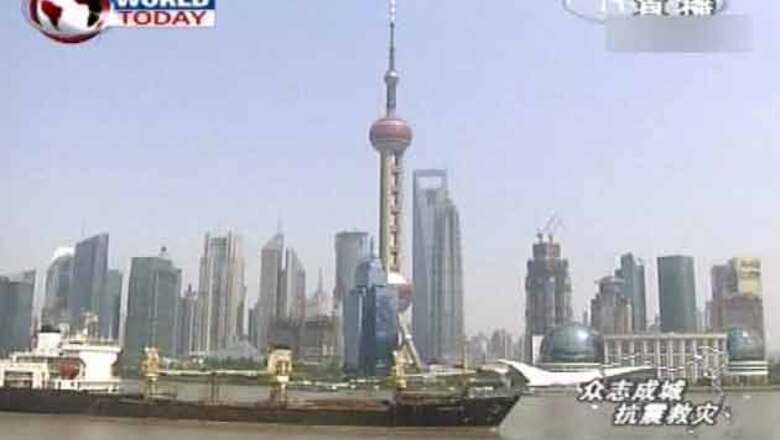
views
Beijing: A collision between a Chinese fishing boat and a Japanese coast guard vessel during a chase near the Diaoyu Islands has turned into a diplomatic war between the nations.
A Japanese court has approved the extension of the detention of the boat's captain, Zhan Qixiong, until September 29, drawing a flurry of protests from Beijing. This has escalated to bigger issues.
At least three times in the past 18 months, Japan has complained of Chinese warships sailing in waters it claims as its own. The dispute has even extended to skirmishes like the mysterious death of a Chinese Giant Panda in Japan.
The crux, however, lies in the fact that China this year surged past Japan to become the world's second-largest economy and also ownership of an uninhabited atoll between Taiwan and Okinawa in the East.
It began with a collision between two boats in the nautical middle of nowhere. Since then, the escalating dispute between China and Japan has seen a captain detained, ministerial contacts severed, public demonstrations and an investigation launched into the mysterious death of a giant panda.
On the surface, the quarrel between China and Japan is over the ownership of an uninhabited atoll between Taiwan and Okinawa in the East China Sea. But barely camouflaged in this week's war of words is a raw test of strength and wills, an attempt by Beijing to assert its new dominance in the region, and to put waning Tokyo in its place.
The incident that sparked the row originally appeared insignificant: the Chinese fishing boat Minjinyu 5179 collided with one Japanese coast guard vessel, then another, during a chase on September 7 in the waters off the disputed islands known as the Diaoyu islands in China and the Senkakus in Japan.
Japan's decision to seize the ship and detain its captain and 14-man crew infuriated China's rulers. They began their diplomatic counteroffensive by repeatedly calling the Japanese ambassador to Beijing on the carpet -- including one summons in the wee hours -- then abruptly escalated matters by cancelling high-level contacts with the Japanese government.
The bottom of the crisis, so far, came when a giant panda named Xing Xing, on loan from China to Japan, died two days after the boat collision, apparently of a heart attack while under anesthetic.
Unsatisfied with that explanation, China sent a team of investigators to Japan to determine what really killed Xing Xing.
The two powers have been on a collision course long before the boat incident as the regional balance has tilted more and more sharply towards Beijing in recent years.
At least three times in the past 18 months, Japan has complained of Chinese warships sailing in waters it claims as its own. More disturbingly for many in Tokyo, China this year surged past stagnant Japan to become the world's second-largest economy.
The dispute over the island chain, which is also claimed by Taiwan, dates to the end of the Second World War. Though awarded to Japan by the United States, the rival claims became much more significant in 1969 when a geological survey indicated that the waters around the islands could be home to as much as seven trillion cubic feet of natural gas and upwards of 100 billion barrels of oil.
Whether or not the incident involving the Minjinyu 5179 was contrived, both sides seemed ready to capitalize on it as soon as it happened.
The incident also allowed Japanese Prime Minister Naoto Kan to flaunt his tougher side, taking a popular stand against China just in time to help him fend off a strong challenge to his leadership from within his own Democratic Party of Japan.
Meanwhile, hawks inside the Communist Party leadership in Beijing emerged to demand a demonstration of China's new clout vis-à-vis its neighbour.
"It should be apparent by now that China will be forced to endure long-term conflicts with Japan, and emphasizing only friendly relations is not prudent," read an editorial in the Global Times, a newspaper affiliated with the Communist Party.
"Provoking China comes with a heavy price tag. Finding Japan's soft spot will help end its hostile policies against China during its rise."
While the Minjinyu 5179 and its crew have since been returned to China, a Japanese court on Sunday approved the extension of the detention of the boat's captain, Zhan Qixiong, until September 29, drawing another flurry of protests from Beijing.
Now, however, both sides seem to want the situation to cool down before it gets out of control.
On Saturday, China moved to dampen anti-Japanese demonstrations around the country. Online postings calling for protests were deleted and while a small number of students were allowed to march on the Japanese Embassy in Beijing, they were quickly sent home by police.
Japan's chief cabinet secretary, Yoshito Sengoku, warned that the situation risked getting out of control if "extreme nationalism" were allowed to get the better of rational relations between neighbours.
The key remains the fate of the boat captain, Zhan. China demands that he be immediately returned. Japan seems intent on putting him on trial under its domestic law for "obstructing officers on duty."
The further the case goes in the Japanese court system, the worse relations between Tokyo and Beijing -- already at their lowest point in five years -- are likely to get.
Despite all the rhetoric, however, neither side seems interested in damaging the growing trade relationship between the two nations.
China last year became Japan's biggest trading partner, and there are few signs of that changing any time soon. Bilateral trade in the first six months of this year hit $ 147-billion, a jump of 34.5 per cent over the same period in 2009.




















Comments
0 comment